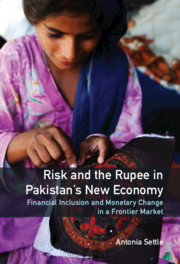 Risk and the Rupee in Pakistan's New Economy
Risk and the Rupee in Pakistan's New Economy Published online by Cambridge University Press: 31 March 2020
Chapters 1, 2 and 3 explored increasing complication in the monetary environment. In Chapters 1 and 2, monetary change was depicted in terms of how traditional norms and theories by which state money is understood as money – its conditions of creation, its reliability, its pliability and plausibility as a policy object, its role amidst the myriad of financial instruments and its capacity to fulfil the traditional functions of money more generally – is being challenged by globalised markets. In Chapter 2, this was accompanied by a mapping of the monetary environment in the specific context of a frontier economy. Emphasising the importance of perceptions of stability, this mapping delineated economywide foundations on which trust in money stands and in which monetary contestation may conceivably arise. This framework served to inform the history of the rupee recounted in Chapter 3, which emphasised growing uncertainty within the monetary environment by drawing out instability, informality and increasingly visible anchoring issues as the post-liberalisation period progressed. These chapters have thus set out a macroeconomic context in which state money is revealed as suffering a deficit in the stability and reliability that credible money demands. This predicament suggests a potential reallocation of state money from its classic Keynesian function of the risk-free asset, to a subject of risk management, a reading that is consistent with Pakistan's ‘enigma’ of slow progress in financial inclusion (Rasmussen 2018).
Drawing the focus down to the level of microanalysis, the next two chapters shift the focus onto ordinary people and their utilisation of money in the everyday economy. This chapter lays out the terms in which household money use is explored in the study and Chapter 5 applies these terms through a household survey. At issue is the identification of changing money use patterns that might reflect the shifting status of the rupee from risk-free asset to subject-of-risk, and thus point towards everyday acts of monetary contestation that might reveal the kind of distrust in money that is so central to sociological theories of money. If changes in daily economic transactions – amongst households and in bazaars – can be identified in connection with financial conditions that have undergone change with the liberalisation of money and markets, then substantive meaning attached to the liberalisation of money on the ground, amongst ordinary Pakistanis, can be pinpointed.
To save this book to your Kindle, first ensure no-reply@cambridge.org is added to your Approved Personal Document E-mail List under your Personal Document Settings on the Manage Your Content and Devices page of your Amazon account. Then enter the ‘name’ part of your Kindle email address below. Find out more about saving to your Kindle.
Note you can select to save to either the @free.kindle.com or @kindle.com variations. ‘@free.kindle.com’ emails are free but can only be saved to your device when it is connected to wi-fi. ‘@kindle.com’ emails can be delivered even when you are not connected to wi-fi, but note that service fees apply.
Find out more about the Kindle Personal Document Service.
To save content items to your account, please confirm that you agree to abide by our usage policies. If this is the first time you use this feature, you will be asked to authorise Cambridge Core to connect with your account. Find out more about saving content to Dropbox.
To save content items to your account, please confirm that you agree to abide by our usage policies. If this is the first time you use this feature, you will be asked to authorise Cambridge Core to connect with your account. Find out more about saving content to Google Drive.